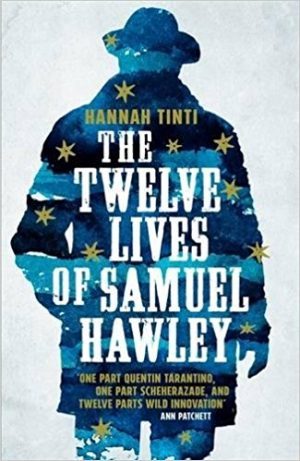 Written by Hannah Tinti — Samuel Hawley wears the evidence of his past brushes with death on his skin, in the form of scarred-over bullet wounds that are the organising principle of this fine book. Chapters describing the circumstances under which he got Bullet Number One, and so on, are interspersed with chapters about his peaceful, if not uneventful, life with his late wife Lily and daughter Loo. Although Hawley is a criminal and the book details his many crimes, it’s also about love and retribution. It’s about universals as ancient as the 12 labours of Hercules.
Written by Hannah Tinti — Samuel Hawley wears the evidence of his past brushes with death on his skin, in the form of scarred-over bullet wounds that are the organising principle of this fine book. Chapters describing the circumstances under which he got Bullet Number One, and so on, are interspersed with chapters about his peaceful, if not uneventful, life with his late wife Lily and daughter Loo. Although Hawley is a criminal and the book details his many crimes, it’s also about love and retribution. It’s about universals as ancient as the 12 labours of Hercules.
Many chapters are told from the third-person point of view of the adolescent Loo. Typical of teenagers, she is mostly uncurious about her father’s past, accepting his scars and his affinity for firearms as merely the familiar backdrop of her own story. When the book opens, he’s retired from his life of crime, yet its first lines are: “When Loo was 12 years old her father taught her how to shoot a gun.”
Hawley had a couple of misspent decades, starting with an armed robbery when he was a runaway teenager. His escapades were mostly as muscle-and-gun-for-hire on behalf of someone else, and several of them involved the acquisition of rare and costly timepieces. Gold pocket watches with diamond and sapphire star charts embedded in the case, a rare and ancient water clock called a clepsydra. Hawley hauled the cash, made the trade, returned with the goods. If only it always went that smoothly.
Tinti’s choice of time-pieces, and a few other recurrent themes in the narrative – celestial navigation, a great humpback whale, even water – give the book depth and resonance. If you prefer to focus on the fates of Loo and her father, both terrifically engaging characters, these themes do not intrude. (Apparently, the novel has already been optioned for television.)
Loo and Hawley have a strong, believable, and loving relationship, but their interactions with Lily’s mother, Mabel Ridge, are far more prickly and at times hilarious. When Lily had arranged for Hawley to meet her mother the first time, she was rightly apprehensive, but he was so in love with her, he was willing to face that Gorgon. “‘Right now,’ said Lily, ‘I’m glad you don’t have any parents.’ ‘Me, too,’ said Hawley. But he was lying. There’d been plenty of times over the past six months when he’d wished he had someone to show Lily off to.”
Tinti’s writing is full of similarly honest, unsentimental devotion. The only time his bond with Loo is seriously threatened is when the troublemaking Mabel Ridge makes a devastating accusation against him. When Loo confronts him, Hawley reacts in a way only this deeply imagined character could.
Loo spent her earliest years living with her grandmother as Hawley fled his memories with jobs in the Pacific Northwest, Alaska, and elsewhere. When Loo is about four, he collects her from Mabel Ridge, and she thereafter accompanies him back and forth across the country. He’s a man on the run who says, “The past is like a shadow, always trying to catch up.” They live somewhere six months or a year, then move on, racing to pack up and go on an hour’s notice. First packed, then unpacked is Hawley’s makeshift shrine to Lily, his endless grief made tangible.
By the time Loo is 12, they have settled in the coastal town of Olympus, Massachusetts – Manchester-by-the-Sea country – where Lily grew up, so that Loo can attend junior high school. As you’d imagine, she does not fit in easily.
Tinti effectively describes this community of people whose lives depend on the cold bite of the Atlantic Ocean and a continuing supply of fish. Among the flinty townspeople is a lone, but inevitable woman doggedly advocating for making the locals’ fishing grounds—the Bitter Banks—a marine sanctuary. If you want to turn yourself into a hometown pariah, this is a good strategy.
Loo finally comes to understand the woman and her motivation, one that could serve as a summary of the whole book: the desperate need to be loved. She sees that people’s hearts are “cycling through the same madness—the discovery, the bliss, the loss, the despair—like planets taking turns in orbit around the sun.” This desperation is as true for Hawley, with the ever-present likelihood his crimes will one day catch up to him, as for any of them. Or us.
If you like a bit of literary crime fiction, try these all-time greats.
Tinder Press
Print/Kindle/iBook
£8.49
CFL Rating: 5 Stars









